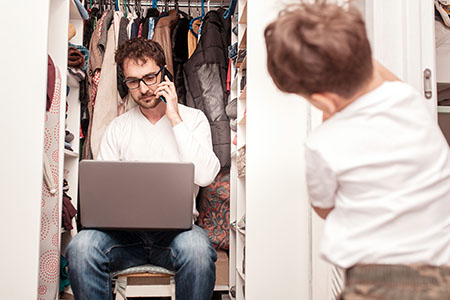 |
| |||

Are you ever going back to the office?
Living and working at home in close quarters can get old pretty fast. But WFH has also proven to be so productive for so many people that they may never make that commute again.
23-Jun-20 – A whole bunch of us who have spent decades in the office have somewhat painfully but importantly learned just how efficient and productive we can be working from home (WFH). Now we have to make up our minds about what comes next. Plenty of the bigger tech firms are suggesting that WFH is worthwhile for a lot of employees – “forever,” according to Jack Dorsey from Twitter. Hundreds of other large and small businesses are saying it’s worth a hard look. Just the fact that Zoom meetings – for all kinds of physical and mental reasons – are automatically half the length of in-office confabs means that we’ve collectively saved jillions of wasted and unproductive hours that would have otherwise been spent listening to Stewart spew, Carl carp, and Polly pontificate. Longer home hours of our own making, fewer unplanned interruptions, and complete control of our workdays and nights have given us a new perspective on how best to get our jobs done – and when and where to do so.
Just putting the millions of hours we’re not spending commuting to better use has to be a huge boost to overall productivity. Yes, I understand the growing desire to get out of the house and that WFH is impractical for a lot of people for a lot of reasons. But that’s not the same as wanting to get back to your building so you can drink stagnant water from dormant pipes, constantly swab everything in sight with your Clorox wipes, and join the lines of people waiting to pile into sanitized elevators in small – socially-distant and masked – groups. Aside from peer and superior pressure, a little FOMO, and your significant other’s desire to boot you out the door, it’s hard to make much of a compelling case for a hasty return. So, it’s no surprise to me that a lot of the folks I speak to – who have some realistic semblance of control over their business lives and activities – haven’t quite decided if, whether, and/or when they’re ever going back to the office. I realize that I’m talking about certain sectors of the economy – creatives, computer geeks, consultants, entrepreneurs, and knowledge workers for sure – and that there are millions of essential workers with little or no choice in these matters. I’m sensitive to these realities and I’m grateful and appreciative – as I hope we all are – for their efforts and continued sacrifices on our behalf. But we have to consider the prospect that costly commuting, polluting congestion, and co-morbid commingling with co-workers aren’t all that they’re cracked up to be.
I’m talking about the fact that, in retrospect, no one I know actually missed the “good old days” in the office that much during the shutdown. I hope we also learned a few things at home that hopefully won’t get lost in the transition back by those who want to or need to return to the fold... • Death to overly long and unproductive meetings It couldn’t be clearer that, in almost any environment, we can get more done in shorter and smaller meetings with fewer props – often fewer participants – and precise, concise agendas that are rigorously observed and adhered to. Better another meeting than a boring and over-extended one. Longer meetings have diminishing returns. What’s also evident is that not every thought, idea, or contribution is a good one and session leaders need to be far more aggressive in managing the flow of meetings. They need to cut off discussions headed nowhere without regard for political correctness or hurt feelings. They need to watch the clock and make sure that the meeting ends on time with specific and detailed action items for all of the participants. Democracy in meetings is not a virtue. Anyone without a job to get done at the meeting’s end most likely didn’t need to be at the meeting in the first place. By and large, your inbox reflects other people’s priorities rather than your own. WFH gifted us immense control over the timing and degree of responsiveness we exhibit to all inbound demands, whether large or small, top down or bottoms up. Because it became “clear” to all that there might be competing and superior concerns, requests, and demands on our own time and resources. Family obligations, health and wellness issues, access, timing, and connectivity concerns, etc., all trumped others’ attempts at abrupt scheduling, calendar clutter, meeting mania, and other time sinks. The truth is that things at home weren’t clear at all – working at home was completely opaque to the outside world – and no one but you was in charge of your time and actions. It was OK to be MIA. This is a luxury that is important to try to preserve as you return to the office because, in all honesty, it’s one of the central reasons that you were so efficient and productive at home.
Create some spaces and time slots to be left completely alone at the office so you can get some stuff done and done right. • Not everyone gets equal time “Hiding” at home (a/k/a MIA) had another important advantage. Because you were relatively unreachable, most of the actual conversations taking place during a typical day were those chosen by – and initiated by – you. These were intentional and ideally purpose-driven rather than accidental, uncomfortable, or inadvertent. Not only were you no longer at the mercy of drop-ins, pages, and other random conversations, you had the ability to prioritize your contacts and decide whether, if, and when it was important to speak to certain people while easily avoiding wasting time with others. It was a whole lot more effective than trying to keep your door closed at the office, which actually seems to encourage people to stick their heads in just for the sake of making sure you’re not sleeping on the job. And, because you’ve made the call, you also have a substantial amount of control over how long it lasts. You’re not trapped in your own office or someone else’s or in the lunchroom by someone with nothing better to do than sit and “share” ad nauseum. At home, there’s nothing like a dog or a kid or another call to provide a convenient and timely exit to any conversation. Answering machines, caller ID, and voicemail have enjoyed a real resurgence since the pandemic began. They all used to be a chore and now they’re really the first line of defense and avoidance. Screening your calls was a key to preserving your sanity. So, if you have to go back – or want to – buck up, have a plan, and don’t go backwards. Take control of your time and your calendar and make the system work for you. And don’t let anyone else push you around – because you can always go home again.
By Howard Tullman | Loop North News | h@g2t3v.com
Published 23-Jun-20 5:09 AM
|





